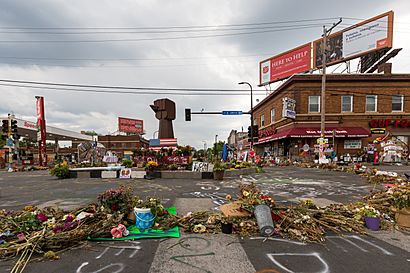George Floyd Square occupied protest facts for kids
Quick facts for kids George Floyd Squareoccupied protest |
|||
|---|---|---|---|
| Part of George Floyd protests in Minneapolis–Saint Paul | |||

George Floyd Square, June 2020
|
|||
| Date | May 26, 2020 – present | ||
| Location |
Minneapolis, Minnesota, United States
44°56′03″N 93°15′45″W / 44.9343°N 93.2624°W |
||
| Caused by | |||
| Goals | List of 24 demands | ||
| Methods |
|
||
| Status | From June 20, 2021, traffic is open to vehicles on the streets leading to the square | ||
| Parties to the civil conflict | |||
|
|||
| Casualties | |||
| Death(s) | 6 | ||
Center of the protest zone in Minneapolis. |
|||
George Floyd Square is a special area in Minneapolis, Minnesota. It is located at the corner of East 38th Street and Chicago Avenue. This spot became a place for memorials and street art.
On May 25, 2020, George Floyd was killed here by a police officer. This event was filmed by people nearby and shared widely. It led to protests around the world. These protests were about police actions and unfair treatment of people based on their race.
Soon after Floyd's death, people began leaving memorials. The intersection became a protest site for over a year. People put up barriers to stop cars. They also added helpful services and public art. Some called it a "police-free" zone, but city officials disagreed.
Contents
What is George Floyd Square?
George Floyd Square is an important memorial and protest area. It is named after George Floyd. He was a Black man who died during an arrest on May 25, 2020. A police officer knelt on his neck for several minutes. This happened outside the Cup Foods store.
His death caused many people to protest. They wanted to end police violence and racism. The intersection became a central place for these protests. It was a place where people could remember George Floyd. They also shared messages about racial justice.
The Start of the Protests
After George Floyd's death, many protests happened in Minneapolis–Saint Paul. Some of these protests involved property damage. However, the gatherings right at the square were peaceful. There was no damage or stealing there.
The intersection became a place where many people visited. They came to protest Floyd's death. They also protested other forms of racial unfairness. It was seen as a "sacred space" during the day.
Challenges in the Area
The neighborhood around the square faced some challenges. Even before the protests, it had a reputation for gang activity. After Floyd's death, there were more violent crimes. Gunfire incidents also increased, especially at night.
Several people were killed by gun violence near the square. This happened in the months and years after Floyd's death. These events showed the ongoing safety concerns in the area.
Reopening the Square
The City of Minneapolis started planning for the square in late 2020. They wanted to keep the public art safe. There was much discussion about how to reopen the intersection.
Some people wanted the barriers removed. Others wanted the protest to continue. They wanted their community demands to be met first.
Traffic Resumes
The trial for the police officer involved in Floyd's death began in March 2021. After the officer was found guilty on April 20, 2021, protest organizers spoke out. They said they would keep protesting. They would hold the square until their demands were met. This included waiting for the trials of other officers.
City workers removed the barriers on June 3, 2021. This was part of a plan to reopen the area. Cars began driving through the intersection again on June 20, 2021.
Ongoing Protests
Even after the streets reopened, the protest movement continued. People kept raising their voices at George Floyd Square in 2022. The square remains a symbol of the fight for racial justice. It is a place where people remember George Floyd.
Images for kids
 | John T. Biggers |
 | Thomas Blackshear |
 | Mark Bradford |
 | Beverly Buchanan |


